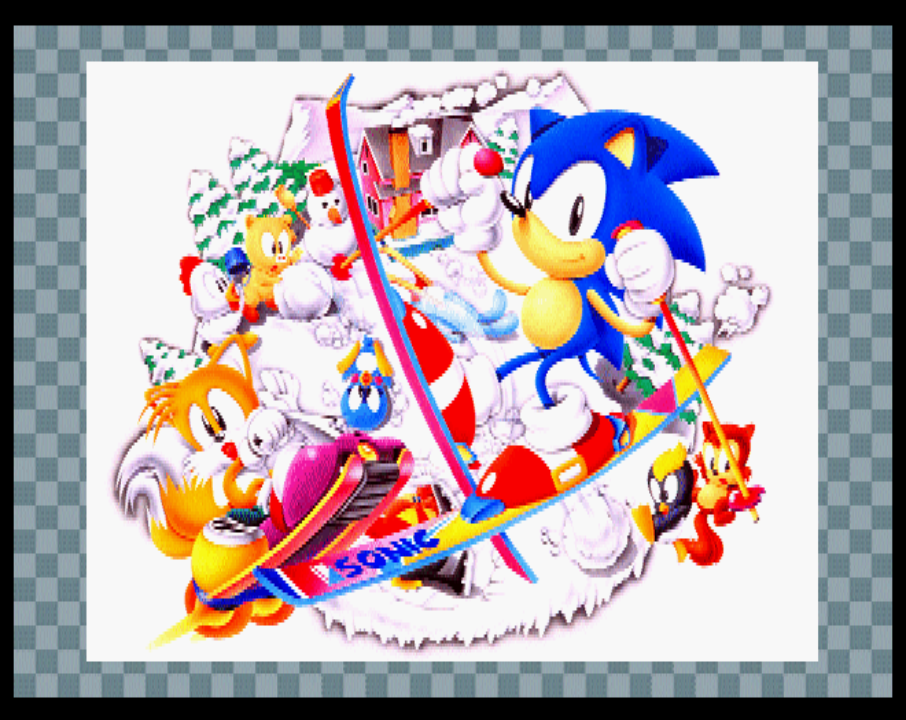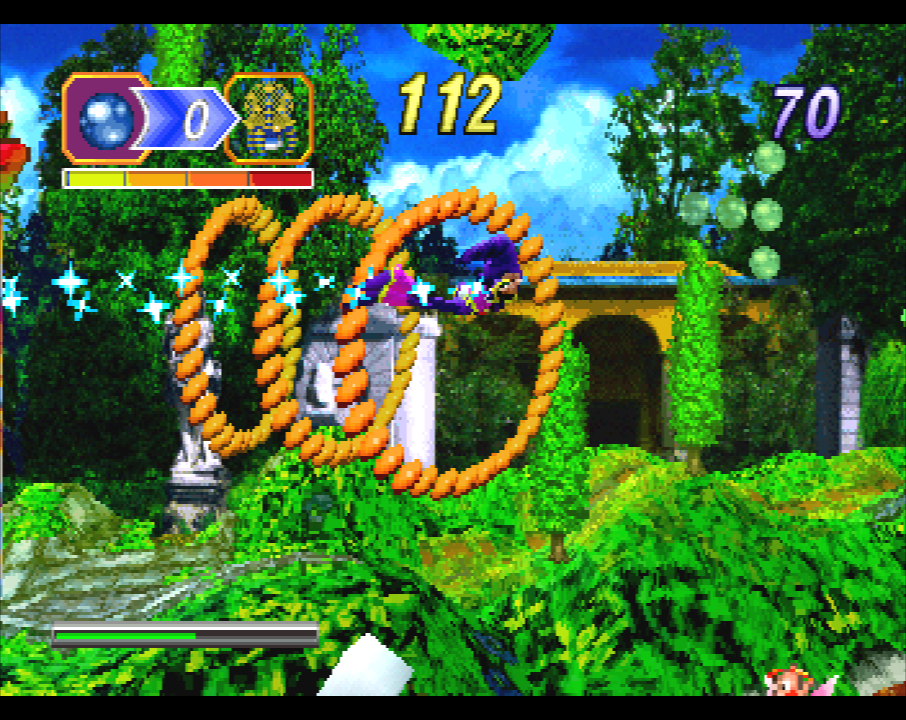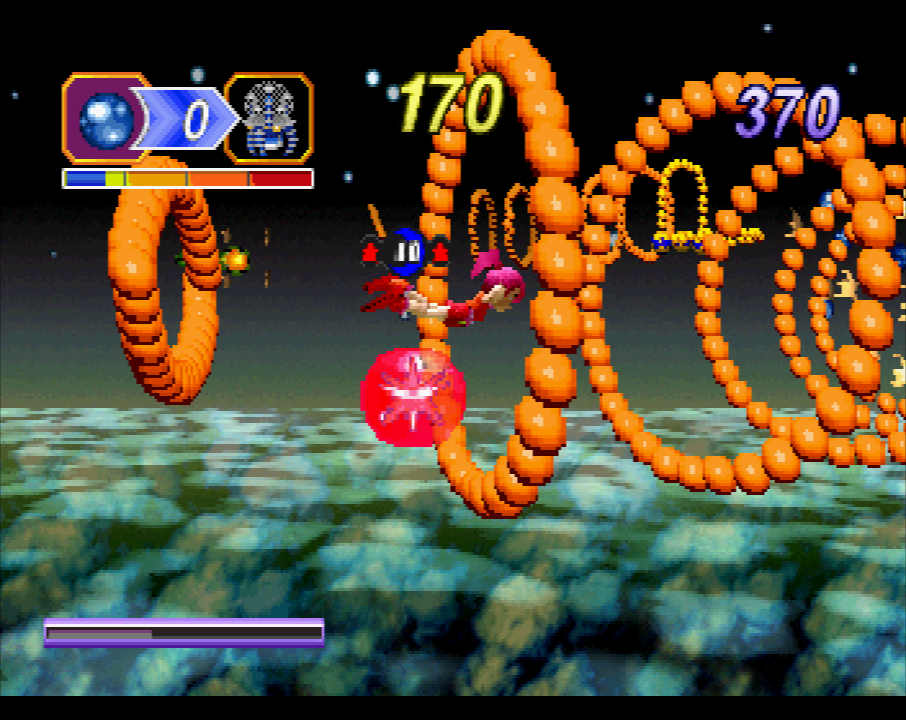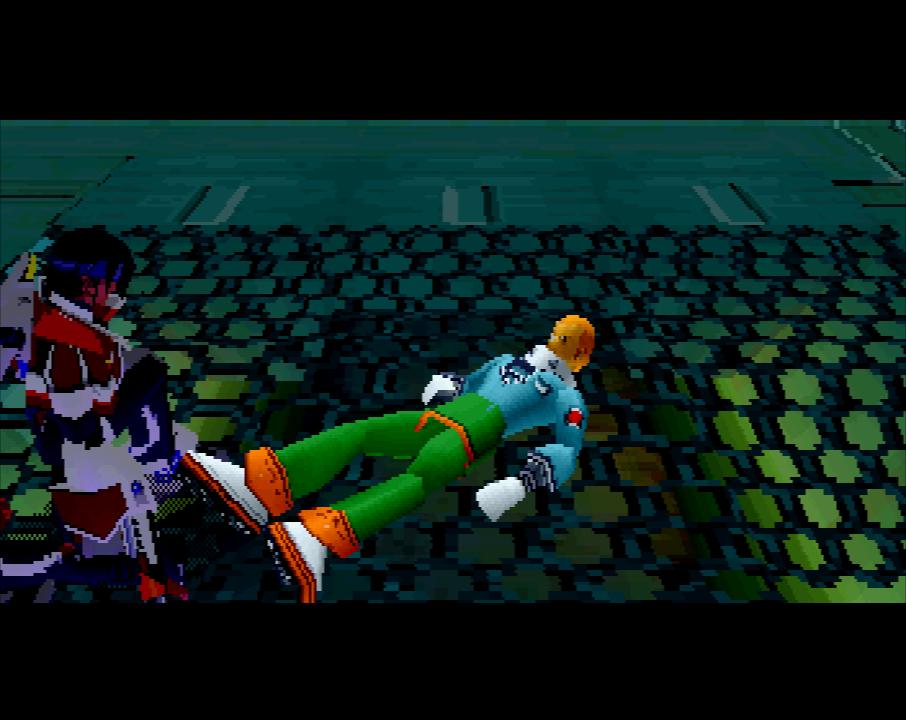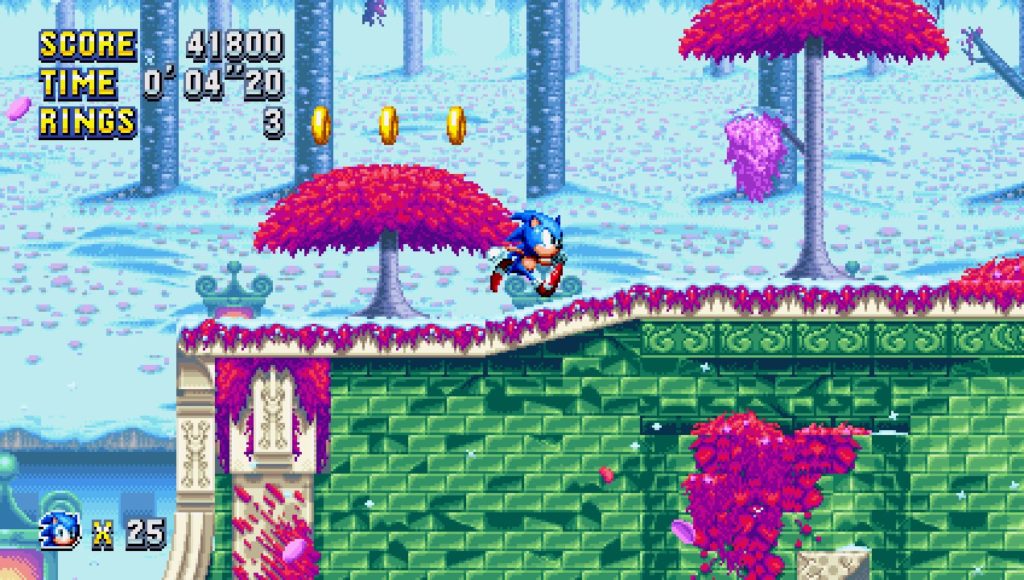There’s this weird aspect of my personality that I’m not sure if any normal person has, but I’ll describe it anyway: associating doing or enjoying something during a specific time of year. Like, I like to listen to certain music, or watch certain movies, or play certain games, or go out to certain place at a time of year arbitrarily designated by the pleasure centers in my brain. For example, it’s Fall, heading towards the Winter. It’s cold, windy, raining or snowing. The sun goes down at 3 PM. This is the time where my music playlist is almost exclusively the dreamiest of Dream Pop, the gaziest of Shoegaze, and the spaciest of uh, Spacy shit. It’s the kind of music you can vibe to while wearing more layers of clothing and constantly underneath a blanket when you aren’t up and moving around.
I do this with games too. Strangely enough, this is the period of time that I most associate with Sega. Mostly Sonic Team, but I might as well lump in the whole company because I have a few notable inclusions. This very specific time in Sega’s life: the twilight of their days as a first-party developer, is something that I am utterly obsessed with when the temperature outside begins to drop. Ironic, given how most of these games are set during the sunniest days of Summer. Now, I’m sure one of you out there is saying, “well, you probably feel this way because Sega consoles tended to come out during that time of year to capitalize on the holiday shopping season.” Or maybe pointing out how several of the games I’ll be talking about (and some that I won’t) take place at the end of the year, or even have their own holiday-themed expansions. That’s probably true, but I prefer liking these games and their aesthetics during this time due to feeling warm and fuzzy, and not your “facts,” okay?
The period of time in Sega’s existence; that Saturn era, before the days of the Dreamcast, and the end of an era, where all these games had themes and message of hope. Characters doing the right thing because it was the right thing to do. Characters being friends and shown having lives outside of whatever adventure the player would take them on. Games with worlds that you could conceivably chill out in.
Basically, stuff that is like a playable version of those gallery drawings from Sonic Jam:
There’s something cute about Sega characters just hanging out. And hey, maybe it turns out that I like playing these cute games during a time where culture pressures you to spend time with your family. I don’t, and never really did honestly, have much of a family to speak of. In recent years, I’ve supplanted “family” with “close friends.” What do we do? We laugh, we joke, we have fun, we spend time being happy together, regardless of what life might throw our way. I don’t want to say that playing these games feels “cozy,” because the internet ruined that term, so I will say “warm” instead. These are games that, no matter how outlandish they might get, give me that same feeling of loving your friends.
500 words in, I should probably actually start talking about some of these games. I’ll start with Sonic R. Now, I am not for a second going to pretend that Sonic R is any good, because it’s not; it’s a barely playable disaster where the simple act of moving in a straight line is an impossibility. It took Travelers Tales a while before they started making good games. Now, having just trashed the game, I’m not bringing up Sonic R because I enjoy playing it (I don’t). I like looking at Sonic R. I like listening to Sonic R. I like the idea of Sonic and his friends having a foot race for the sake of having a foot race, even if Sonic has a distinct advantage over the rest of his friends (in theory anyway, since all of the characters control like shit, regardless of acceleration). A Sonic game with incredibly low stakes, where everyone involved is having a fun time in these gorgeous environments and listening to some amazing EDM is by no means a bad idea. It’s just too fucking bad that the part where you have to actually play Sonic R is dreadful.
Audio Player(Some of the amazing music I mentioned.)
All that being said, I still like to load the game up and give it a quick Grand Prix or two before I switch over to one of the other games I’ll be talking about. Despite all of its problems, I still love knowing that a game where a bunch of friends play together exists on my Sega Saturn.
Sonic R is essentially, a game about children playing (yeah, there’s Robotnik in there, but who cares, he’s always a non-issue). It’s cute. Now we’re going from children playing, to children struggling with their own insecurities.
NiGHTS Into Dreams (stylized as found) is a rightfully beloved Sonic Team release. Most people react to it with confusion, wondering just what the fuck exactly NiGHTS is. I imagine the expectation the world had for it, as I had going in, was that it was another platformer. It’s not. It’s this unusual, genre-defying game about flying around while collecting as many points as quickly as you can. If anything, NiGHTS uses that “gotta go fast” concept more than Sonic ever has.
NiGHTS is also a game about two kids, Eliot and Claris, who are struggling with their own G-Rated issues. Eliot wants to become a star Basketball player, but gets absolutely wrecked by a rival team, while Claris wants to become a singer, despite suffering from severe stage fright. While all this is happening, a creature known as Wizeman is plotting to take over the dream world, which will have consequences for the real world, and it just so happens that Eliot and Claris have the ability to stop Wizeman. In doing this, both of them overcome their shortcomings and realize their dreams of shooting hoops and singing. It’s cliched; “the power was inside you all along, and all you had to do was believe” is something that you’ve seen in just about any kid’s movie made since the 1970s. But there’s something to how NiGHTS pulls this off. You’ve heard the term “Disney Magic” before, right? I’m going to coin the term “Sega Magic” here. That company had many talented teams of great artists, great musicians, great programmers, and two or three madmen that were capable of directing them into some of the most timeless works in the history of the medium, despite the repeated incompetence of the suits at the top.
Like, fuck me, this is a game about teens overcoming mild adversity in a cutesy video game that’s rated E for Everyone. Yet there’s this part of me, without fail, that has a bit of an emotional reaction every single time I reach the end. That final level, where the two teens no longer need to use NiGHTS as their androgynous avatar anymore, and are capable of flight and the ability to stop the Nightmaren on their own. The song that kicks in as soon as you take to the skies, flying around this clock tower full of ascending balloons and falling stars, the entire game leading up to this point, is incredible.
Audio PlayerYou make it to Wizeman, and you defeat him, realizing your true potential. Eliot lands that slam dunk. Claris sings her heart out, impressing an entire casting crew. Then there’s that extra ending you get upon finishing the game with both characters, where they meet up in real life. It’s all very sweet and genuine; this wasn’t just something made to be pushed out the door so Sega could recoup their staggering losses during this period. NiGHTS Into Dreams very much feels like it was made with love, by people who gave something of a fuck.
And then it happens: that credits music kicks in. NiGHTS is a very short game that you can probably run through faster than actually reading this post, but it leaves a mark on you in that brief time. I am an adult in my 30s, and this ending still gets me emotional. Dude, I am literally crying while writing about this right now!
Audio PlayerMaybe if you’re a normal member of society, NiGHTS is nothing more than a cute way to pass an hour. But maybe for people like me, who deal with insecurities and self-doubt, who oftentimes feel like their best is never good enough, it hits different. The fact that this game has two protagonists to illustrate that, holy fuck, you are not alone, hits different.
For all the emotional weight that NiGHTS has, there is one more trick up its sleeve to turn me into a blubbering mess that will try to power through the rest of this piece despite my inevitable ugly crying.
I’ve mentioned before that my familial relationships are non-existent. As such, Christmas was never a fun time. That holiday merriment quickly degenerating into drunken fighting, people throwing shit, then everyone screaming at me (or worse) because I was small and didn’t have the resources or knowledge to become emancipated. You combine that with my own cynicism about capitalism and religion, and I fucking hated Christmas. I still kind of do, honestly. The dumbfuck racists continuing to lose their minds over “Happy Holidays” because giving the most half-assed recognition to Jewish people is a step too far, I guess. The endless conveyor belt of identical Christmas movies on the Hallmark Channel where two affluent white people fall in love thanks to the spirit of the season. The constant push to Buy Shit. My ideal Christmas, and one that I successfully managed to have last year, is one where you get together with the people you truly love, and you reflect on the year that was. All the good, all the bad, and all the things you want to do in the next one.
Christmas NiGHTS Into Dreams is a small expansion to NiGHTS. The story to this one is that everyone is way too fucking busy and way too fucking stressed out on Christmas. People are pushing each other to get that popular gift that’s in limited supply due to artificial scarcity. Just an excess of good old American Spending. So Eliot and Claris take a short trip through the dream world again, and when they return, everyone has finally chilled the fuck out.
Christmas NiGHTS is even shorter than the original game, only having one level, but it manages to make yet another mark on you emotionally. It has a simple message: just be fucking nice to each other.
Sonic R is the gaming representation of an afternoon playing with your friends, which is why I didn’t have nearly as much to say about that, and NiGHTS is a representation of something that can be applied every day, not just the holidays: be fucking cool, dude. Love one another. Maybe it’s the literal decades of military-funded murder simulators and dudes with their heads up their asses trying to deconstruct the platformer genre, but it really doesn’t feel like games like get made anymore. It’s sad.
Now what if all these themes of togetherness and doing the right thing came together in a game where you fought fires instead of your insecurities? That’s where Burning Rangers comes in.
Sonic R, NiGHTS, and Burning Rangers are these bright, colorful games with great music and this sense of hope to them. Peace, love, non-violence, things that are lacking in a lot of games. I know I rag on the whole “wholesome” thing, but that doesn’t mean that I don’t love extremely positive stuff like this.
I love Burning Rangers because it’s this game with a very serious theme (firefighting), but playing the game itself, it is this fun, breezy adventure where everyone gets to go home at the end. You rescue people from industrial accidents, and the only enemies aside from nature are service robots gone haywire and out of control plants. Aside from hope, these are all games with well-defined heroes. The members of the Burning Rangers are a bunch of good people doing the right thing just because. Eliot and Claris are kids with dreams. Sonic and his friends fight Dr. Robotnik to prevent him from industrializing the world. They aren’t “heroes” in the sense of being cops or soldiers, where the level of heroics is subjective based on which side of the gun you’re on. No, Sonic Team decided, this gun will shoot water, and will be used to help people, rather than hurt them.
There’s something to this positivity in the face of the Saturn being an absolute sales failure internationally. I’m sure there were a lot of people at Sega shitting themselves, worried about the status of their jobs. Yet, here are these games that all say, “fuck adversity! Let’s face it head on together!” Burning Rangers was one of the final games released for the system. Everyone was hitching their hopes on the Dreamcast, sealing the Saturn’s fate for good. The final gasp of life from a dying console, full of hope, rather than regret. I have to respect that.
Audio Player
Decades have passed, and Sega has had its ups and downs in the subsequent time since. They no longer make home consoles, and Sonic Team has changed staff, becoming this directionless monster releasing terrible games. This Blue Skies aesthetic has all but disappeared in order to appeal to the nebulous concept known as the Modern Gamer. This magical era of the Saturn is a faded memory that fades further and further over time.
Then, as if willed into existence by fucked up weirdos like me, Sega decides to handle the publishing duties for a fan-made Sonic game.
Sonic Mania is a far too late answer to the question: What If The Saturn Had A Real Sonic Game? The enhanced color palette, the fluid animation, the “Sonic CD but better” music, it’s a spiritual Saturn game.
Mania is a game that Gets It. This is Sonic and his friends going on an adventure to stop a mad scientist from destroying nature. There’s no Shounen An*me bull shit that’s been the way of things since Sonic Adventure 2. Again, it’s colorful, the music is cheery, and the message is “stand together to face some fucked up shit.” Even more again, I love it.
This game also nails something I mentioned earlier better than the other games so far: having a game world that looks inhabitable. Not that you couldn’t live or work in the areas outside the race tracks in Sonic R, or that you couldn’t possibly inhabit the dream worlds of NiGHTS, or the futuristic locales of Burning Rangers, but they’re aren’t the same. Green Hill, Press Garden (act 2), Mirage Saloon, Studiopolis kind of, all have this “lived in” vibe. Like, this is a world that needs to be saved, and not just a series of obstacles for you to clear to get to the next zone. That’s awesome.
These are all games of friendship, light, love, and fun adventure in these areas that would be so cool to actually be able to visit. This shared aesthetic and themes played at this time of year is magical, and I felt the need to spend way too many fucking words trying to explain why I feel that way, hoping that I was successful in doing so. It makes me feel wistful for the Saturn, like maybe it wasn’t appreciated enough during its time. For the most part, that’s true, but then I have to remember the lack of software support outside of Japan (FUCK YOU BERNIE STOLAR), save data getting wiped out due to those watch batteries in the back that died as soon as you put them in the system, and that I would have been too young to be able to afford imports or to have the know-how to properly mod my system. It’s a shame. But at the very least, we’ll always have these games.


